About The Lineage
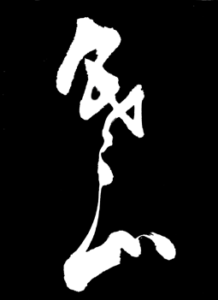 The Cold Mountain lineage belongs to the tradition of Japanese Zen, but it’s a rather unusual lineage. It began during the Ming Dynasty—the 17th century— when a group of monks from Mount Huangbo in China came to Japan and founded what is now called Obaku Zen. Obaku became the third Zen tradition in Japan, the other two being Rinzai and Soto Zen. At the time, the monks from China believed that they were simply bringing the latest form of Rinzai Zen, but in Japan it was treated as a separate school.
The Cold Mountain lineage belongs to the tradition of Japanese Zen, but it’s a rather unusual lineage. It began during the Ming Dynasty—the 17th century— when a group of monks from Mount Huangbo in China came to Japan and founded what is now called Obaku Zen. Obaku became the third Zen tradition in Japan, the other two being Rinzai and Soto Zen. At the time, the monks from China believed that they were simply bringing the latest form of Rinzai Zen, but in Japan it was treated as a separate school.
The leader of the Huangbo delegation was the great master Yinyuan Longqi (Ingen Ryuki), who had revived Zen practice in his native Fujian Province. The style of Zen he brought with him was different from the styles practiced in Japan at the time. The tendency among Japanese Buddhists was to divide rigidly along sectarian lines. Few Rinzai monks had contact with their Soto counterparts. Most Zen monks and nuns stayed away from the followers of the other Buddhist schools. The spirit of Chinese Linji (Rinzai) Zen was much more flexible and all encompassing. It welcomed teachings from all the Chinese Zen schools: the Guiyang, Caodong,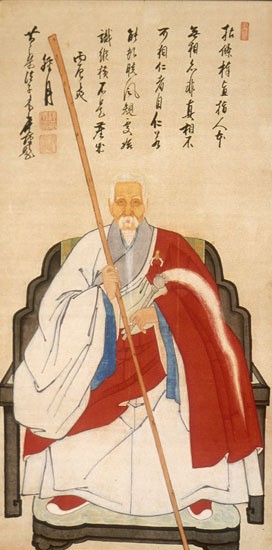 Yunmen, and Fayan lines. It also made a place for the devotional practices of Pure Land Buddhism. This was the Zen that Yinyuan brought, and it remained very much a part of the Obaku tradition.
Yunmen, and Fayan lines. It also made a place for the devotional practices of Pure Land Buddhism. This was the Zen that Yinyuan brought, and it remained very much a part of the Obaku tradition.
Along with Master Yinyuan’s delegation to Japan there was one lone monk who came from the Han Shan Si or “Cold Mountain Temple” in Suzhou. He went on to start a new temple in Japan, Kankoji, in what is now Kameoka.
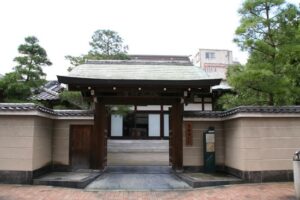
Cold Mountain Temple in China gets its name from a famous Tang dynasty Zen poet Han Shan, “Cold Mountain,” who probably lived in the seventh century. A recluse in the Taishan mountains of southeast China, Han Shan wrote about the happiness and freedom of a life close to nature.
I love the joys of the mountains,
wandering completely free,
feeding my crippled body another day,
thinking thoughts that go nowhere.
Sometimes I open an old sutra,
more often I climb a tower of stones
and peer down a thousand foot cliff
or stare up at swirling clouds,where the windblown winter moon
looks like a crane, flying alone.
–Han Shan
The Han Shan Temple outside the city of Suzhou honors the life of Han Shan. Built during the Liang period of the Southern Dynasty (502-557), the temple was renamed after him. According to legend, he settled there after his wanderings.
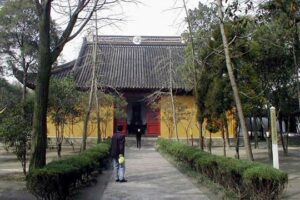
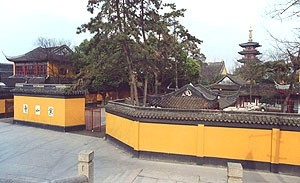
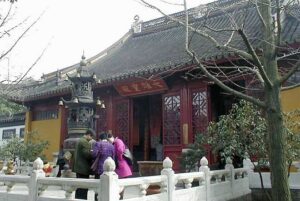
Following the terrible years of World War II, the abbot of Kankjoji in Japan was Miyauchi Kanko. With his young American dharma heir, Kangan Glenn Webb, Kanko set out on a journey to the mother temple on the Chinese mainland. When he reached Han Shan Si, he was welcomed by the abbot, “Nature of Sky,” who acknowledged Webb’s transmission.
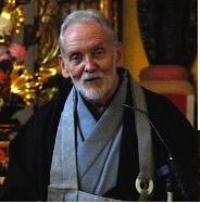
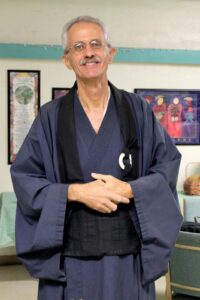 Kangan Webb’s successor in the Cold Mountain lineage is Kankan Kurt Spellmeyer. Kankan began his training with Takabayashi Genki and Kangan Webb at what was then known as the Seattle Zen Center. In 1985, Spellmeyer completed his training under Webb Roshi and was authorized to teach. He received the dharma name Kankan (Ch. Guan Han, “Sees the Cold”) in 1991. He directs the Cold Mountain Zen Sangha in central New Jersey.
Kangan Webb’s successor in the Cold Mountain lineage is Kankan Kurt Spellmeyer. Kankan began his training with Takabayashi Genki and Kangan Webb at what was then known as the Seattle Zen Center. In 1985, Spellmeyer completed his training under Webb Roshi and was authorized to teach. He received the dharma name Kankan (Ch. Guan Han, “Sees the Cold”) in 1991. He directs the Cold Mountain Zen Sangha in central New Jersey.
Kankan is very ably assisted in New Jersey by Sensei Kangetsu Sandy Spina. Sandy, whose dharma name means “Cold Moon,” was ordained at the August sesshin in 2008. She serves as the sangha’s Karmadana (Rector, Jap. Ino, Ch. Weinuo). She is also actively involved in a Buddhist prison ministry.
The Cold Mountain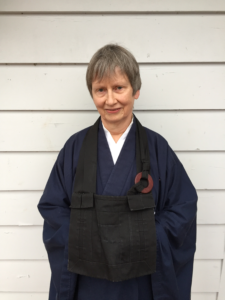 lineage in the United States has now put down roots in Colorado as well, under the leadership of Sensei Kanko Kritee, who received the dharma name of Webb Roshi’s own teacher, Miyauchi Kanko. “Kanko” means “Cold Light” or “Cold Radiance.” Ordained at the Spring sesshin of 2010, Sensei Kanko received authorization to teach independently at the May sesshin of 2013. Her community in Boulder is called “Boundless in Motion.”
lineage in the United States has now put down roots in Colorado as well, under the leadership of Sensei Kanko Kritee, who received the dharma name of Webb Roshi’s own teacher, Miyauchi Kanko. “Kanko” means “Cold Light” or “Cold Radiance.” Ordained at the Spring sesshin of 2010, Sensei Kanko received authorization to teach independently at the May sesshin of 2013. Her community in Boulder is called “Boundless in Motion.”
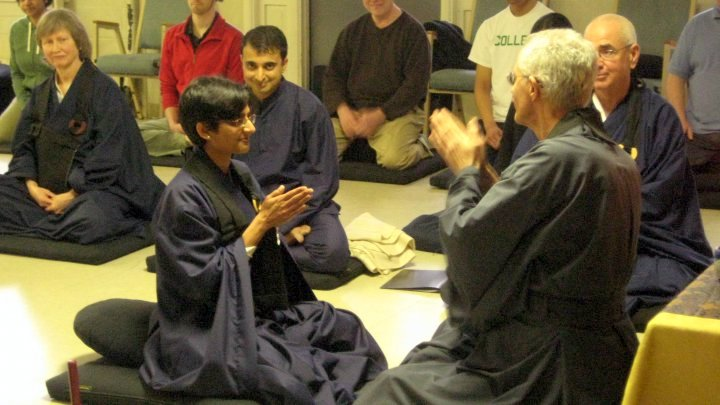 Authorization ceremony for Kanko Sensei.
Authorization ceremony for Kanko Sensei.
Cold Mountain Zen, Inc. is a 501(c)(3) not-for-profit established with the mission to provide for the preservation and transmission of the teaching and practice of Rinzai Zen Buddhism in New Jersey.

